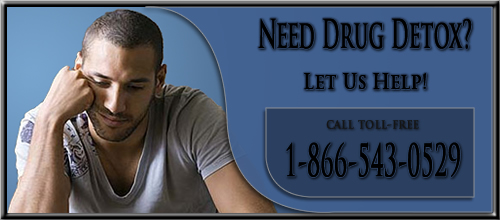Drug Detox
- Heroin Detox
- Cocaine Detox
- OxyContin Detox
- Marijuana Detox
- Crack Detox
- Meth Detox
- Xanax Detox
- Ambien Detox
- Vicodin Detox
- Percocet Detox
- Lortab Detox
- Hydrocodone Detox
- Opiate Detox
- Ativan Detox
- Methadone Detox
- Demerol Detox
- Medical Detox
- Drug Free Detox
- Rapid Detox
- Drug Substitution Detox
- Drug Weaning Detox

Medical Detox
What is medical detox?
Essentially, it is a medication/drug aided withdrawal process. It is a process that mandates the use of proven medicines to ease the withdraw symptoms. These medicines are issued under the care and supervision of qualified medical professionals. A medical detox typically constitutes a stay in a medical facility so that your vital signs can continuously be monitored. It is also important to stay in a medical facility due to the fact that your dosage of medicine should constantly be monitored and supervised to insure the smoothest detox possible.
Why is medical detox necessary?
A person qualifies as an addict when he or she becomes dependent on drugs - taking drugs regularly and experiencing cravings for them despite the harmful effects. These drugs can be prescription medications and/or recreational drugs. Millions of people are successfully recovering from drug addiction today because they have received the right help, before it was too late. Rehabilitation and treatment are effective ways of learning how to stop abusing drugs. So, detoxification, often referred to as medical detox, is the first step in the drug rehabilitation process.
Over any considerable period of drug abuse, the body builds up residual amounts of various chemical compounds contained in the abused drug. These compounds usually collect in the users liver and/or kidneys. In order to negate the addictive qualities of the drug, it and all its component ingredients must be purged from the addict's system. At the same time, because the body has built up a tolerance to the abused drug, the body must also adjust to the absence of the abused substance (a process known as withdrawal).
This must be done carefully and under medical detox supervision to avoid uncomfortable side effects, including bone pain, shaking, sweating, vomiting, rapid breathing, and agitation. More serious and potentially fatal complications of withdrawal can also occur: delirium tremens (violent excitation and emotion, combined with loss of muscle control), hallucinations, convulsions, high fever and stupor (impaired consciousness). During this process, the patient will have great difficulty eating, sleeping and concentrating.
What is the advantage of a medical detox over a non medical?
This is a commonly disputed question around which much debate arises. The advantage to a medical detox is that it takes the pain away. It also provides a safety net for the detoxing alcoholic or addict. However, many qualified treatment professionals do not feel that medical detox is right for each recovering addict. This is because in order for the addict to truly understand the consequences of their actions, feeling the discomfort of drug withdrawal is often an important part of recovery. This is not to say that medical detox is without merit. Many drugs of abuse require this type of detox (prescription drugs, opiates, alcohol, etc.) in order to ensure the safety of the patient.
The human body has amazing capacity to recover from all manner of trauma, and withdrawal is largely a matter of the body doing what the body does whenever it deals with toxins. The primary purpose of medical detox is to lessen the severity of the symptoms of withdrawal, with medications developed especially for this purpose. Pain can be alleviated, vomiting can be controlled, and agitation can be calmed, thereby making the patient more comfortable.
